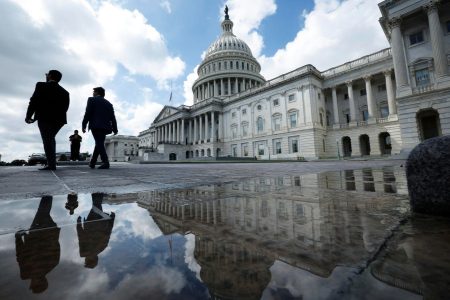The theme of the Republican National Convention’s opening night in Milwaukee was “Make America Wealthy Again.” Speakers one after the other blamed the Biden administration and Democratic policies for the high inflation rates that plagued the country for much of the last three years. But at the same time, delegates approved a new party platform crafted by former President Donald Trump that would almost certainly make inflation worse.
One of the first planks of the GOP’s new platform is “End Inflation and Make America Affordable Again.” Although Republicans want to place the blame for rising prices on President Joe Biden, much of the inflation experienced over the past three years was due to factors entirely outside the president’s control, such as supply-chain bottlenecks and the residual effects of the Covid-19 pandemic.
The primary mechanism by which the president can worsen inflation is by adding to the federal budget deficit: If the federal government pumps more money into the economy through spending than it removes in taxes, those extra dollars help bid up the prices of goods and services. And on this measure, Republicans could make a decent argument: Policies enacted during the Biden administration added more than $4 trillion to deficits over the 10-year window conventionally used for fiscal estimates by the Congressional Budget Office.
The problem here is that Trump added more than $8 trillion to 10-year deficits during his first term as president — nearly twice as much as President Biden did, according to the nonpartisan Committee for a Responsible Federal Budget. And if one excludes the impact of one-time spending enacted in response to the COVID-19 pandemic, the debt created by the Trump administration was four times what the Biden administration created. Many of these policies are still in effect today, such as the tax cuts enacted in 2017 that continue to cost the government hundreds of billions of dollars in lost revenue each year.
In fact, the policies enacted by the Trump administration are responsible for about one-quarter of this year’s roughly $2 trillion budget deficit, while policies enacted by the Biden administration are only responsible for one-fifth. So, if voters want to blame someone for inflation in the economy today, they should be blaming Trump and the Republican Party even more than Biden and the Democratic Party.
Perhaps the GOP could reasonably argue that there was more slack in the economy to absorb higher deficits in 2017 than there is today, and so the Biden administration’s subsequent deficit expansions were more irresponsible than those of the Trump administration. But to make that argument work, Republicans would have to be prioritizing debt reduction now. Instead, they’re moving in the opposite direction: For the first time in decades, the RNC platform doesn’t even pay lip service to reducing the national debt. In place of calls for controlling debt, the platform calls for a mix of policies that together would make it far worse.
One plank of the RNC platform is “Large Tax Cuts for Workers, and No Tax On Tips.” As I demonstrated in a paper published earlier this year, even keeping taxes at today’s levels would be insufficient to maintain current spending obligations. Further tax cuts would only make the problem worse. The proposal to exempt tips from taxation alone could widen deficits by up to half a trillion dollars as it encourages employers to replace as much ordinary income with tips as possible. Promoting more dependence on tipping is particularly bizarre at a time when surveys show Americans are increasingly frustrated by the proliferation of tipping prompts on services for which tipping was never historically customary — a phenomenon some have dubbed “tipflation.”
Another misguided proposal backed by the Trump campaign is replacing all income taxes with taxes on imported goods, known as tariffs. Such a proposal, if it were economically feasible, would actually increase taxes on the typical family by several thousand dollars while cutting taxes by more than $1 million for the average family in the top 0.1% of the income distribution, according to an analysis by the Center for American Progress. But in practice, there is no realistic way to replace $2 trillion in lost income-tax revenue with taxes on $3 trillion of imports, so the proposal is more likely to further blow up the deficit. The tariffs themselves would also be inflationary, because in addition to raising store prices for final consumer goods, they would also raise production costs for manufacturing, agriculture, repair shops, and other U.S. industries by taxing critical inputs.
Previous generations of Republican leaders could at least pretend they would pay for tax cuts by cutting spending even more. But this year’s RNC platform includes a plank to “Fight For And Protect Social Security and Medicare With No Cuts, Including Changes to The Retirement Age.” These two programs are both the largest and fastest-growing part of the federal budget, together comprising almost half of non-interest spending over the next four years. The platform also says Republicans would “Strengthen Our Military,” which party leaders have previously suggested includes more than $6 trillion of new spending over the coming decade.
The only spending cuts mentioned in the RNC platform are vague references to “Cutting Wasteful Spending.” To make the math work, nearly every federal government function outside of national defense and entitlement programs — from SNAP benefits to food safety — would have to be considered wasteful spending. But if the first Trump presidency is any indication of what voters should expect in the second, Republicans are more likely to simply pile on even more debt. At a time when the Biden economy has persistently featured unemployment rates around 4% or below, all this new borrowing would simply drive up prices.
It’s understandable that many Americans may be looking for a change in government after the inflationary pressures of the last few years. But the RNC platform makes it clear: If the American people elect Donald Trump and a Republican Congress, the agenda they seek to enact would only make the problem worse.
Read the full article here










